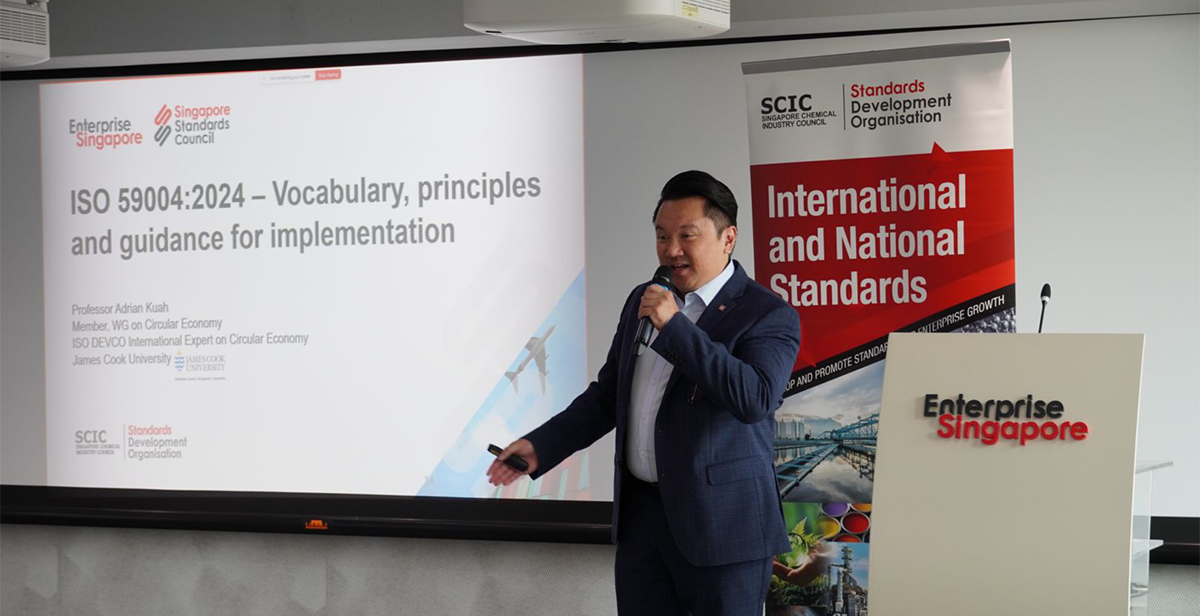Media Releases
James Cook University Professor led dialogue session on new Singapore Circular Economy Standards
Media Releases

Driving the circular economy: James Cook University in Singapore’s Professor Adrian Kuah was one of the key speakers at a dialogue on implementing new ISO Standards as Singapore Standards on 4 December 2024 at Enterprise Singapore.
With increasing pressures on natural resources, our planet faces urgent environmental challenges – from resource scarcity and waste to climate change. The linear economy model, which involves extracting resources, creating products and discarding them after use, is proving unsustainable. Transitioning to a circular economy can aid in reducing environmental impact, renewing resources, and ultimately create a more sustainable future. To support this shift, international standards can help organisations around the world implement circular principles effectively.
In May 2024, the International Organization for Standardization (ISO) published three new standards under the Technical Committee ISO/TC 323, which aim to ensure the transition to a circular economy. As part of the Singapore Standardisation Programme, the Singapore Standards Council will be adopting the three ISO standards as Singapore Standards:
- Vocabulary, principles and guidance for implementation (ISO 59004)
- This standard defines what the circular economy is, including its vision and principles, and offers general guidance on how it can be implemented and contribute to sustainability.
- Guidance on the transition of business models and value networks (ISO 59010)
- This standard provides business-oriented guidance for organisations that wish to transition from a linear to circular a framework. It focuses on strategies to implement circular economy practices at both organisational and inter-organisational levels.
- Measuring and assessing circularity performance (ISO 59020)
- This standard provides a structured framework for organisations to measure and assess their circularity performance and sustainability impacts.
 As a member of the National Mirror Committee, Professor Adrian Kuah, Professor of Strategy and Sustainability, was invited to lead the dialogue session alongside other experts – Professor Seeram Ramakrishna, Professor of Materials Engineering at the National University of Singapore (third right) and Mr Dalson Chung from the National Environment Agency (first right).
As a member of the National Mirror Committee, Professor Adrian Kuah, Professor of Strategy and Sustainability, was invited to lead the dialogue session alongside other experts – Professor Seeram Ramakrishna, Professor of Materials Engineering at the National University of Singapore (third right) and Mr Dalson Chung from the National Environment Agency (first right).
Professor Kuah shared on the ISO 59004 standard (Vocabulary, principles and guidance for implementation), which outlines foundational principles and guidance for shifting from a linear economic model – based on extraction, production, and disposal – to a circular economy model. This approach focuses on sustainably managing resources, reducing waste, and renewing natural systems. By adopting ISO 59004, organisations can develop more sustainable solutions, enhance stakeholder relationships, strengthen compliance with voluntary and legal standards, contribute to climate mitigation and adaptation, and increase resilience against resource scarcity and other environmental, social and economic risks.
“ISO 59004 can help organisations build resilience against resource scarcity and environmental risks. It’s a pleasure to be part of this journey, especially as Singapore integrates these standards into its own circular economy strategies,” says Professor Kuah.
The dialogue, organised by Enterprise Singapore, begins a public consultation process open to all members of the public, especially organisations that are interested in transitioning from linear business models to value creation networks and circular ones.
Find out more about the Singapore campus of James Cook University.
Discover further information on areas of research and research strength at James Cook University in Singapore.
Check out Professor Adrian Kuah’s staff and research profiles.
Contacts
Professor Adrian Kuah: adrian.kuah@jcu.edu.au
Media: Ms Pinky Sibal pinky.sibal@jcu.edu.au / Ms Hoe Shu Rin shurin.hoe@jcu.edu.au